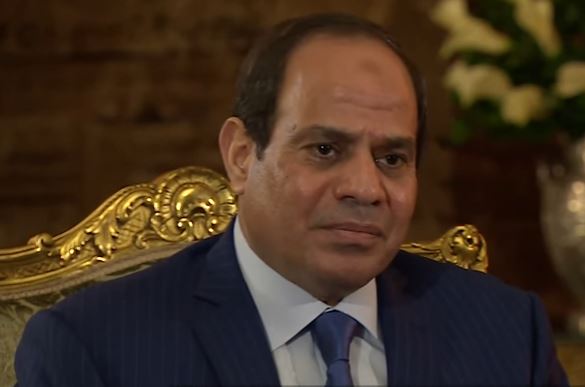
The Guardian, UK: Egypt’s president, Abdel Fatah al-Sisi, has moved one step closer to staying in power until 2034 after parliament advanced a bill that changes the constitution by extending presidential terms and allows Sisi to run for re-election beyond the current two-term limit.
The bill also grants new political powers to the military and extra presidential control over the judiciary, dealing another blow to opponents of Sisi’s increasingly autocratic regime.
In a rare criticism during a debate over the bill, one MP branded the reforms “medieval” and said they were tailored to facilitate absolute rule by Sisi, the former head of Egypt’s armed forces who took power in a coup in 2013.
The bill has moved swiftly through the Egyptian legislature since it was tabled on 3 February, aided by a decision to move the debate forward by several days. On Thursday, 485 out of 596 MPs voted to advance the bill, which also contains a package of more palatable changes such as the creation of a vice-presidential post, a quota of 25% female representation, and a new upper house in parliament.
It is expected to pass a second committee reading and parliamentary debate by early March, triggering a referendum in which the public will be asked to approve the changes.
A coalition of 11 political parties and prominent political figures joined forces to fight the plans, but will struggle to mount a campaign ahead of a referendum in an environment where dissent has been systematically crushed.
“We were expecting that this would happen. The man will never leave power, we all know this,” said Anwar Sadat, the nephew of Egypt’s former president and member of the new coalition, in reference to Sisi.
A growing chorus of pro-state voices has emerged claiming that the president requires more time to enact his flagship economic reforms.
Last year, the Guardian reported the existence of a petition calling for Sisi to remain in office beyond his second term, which circulated within institutions and among pro-state figures. Pro-government lawyers also mounted a legal challenge demanding that parliament – often seen as little more than a vehicle for rubber stamping Sisi’s demands – remove the article in the constitution that sets term limits.
Timothy Kaldas, from the Washington-based thinktank the Tahrir Institute for Middle East Policy, said the opposition’s hands were tied. “The reality is it is quite limited what the opposition can do, given the level of repression that this government is capable of,” he said. “The result is a fairly weak opposition that has been battered by large-scale imprisonment, people forced into exile, and organisations being shuttered.”
One option for Sisi’s opponents is the country’s supreme constitutional court. “Some of the constitutional lawyers we have within the union will explore the possibility that what they [the government] are doing violates the constitution, so we will attempt to bring a court case,” said Sadat.
Khaled Dawoud, a longtime opposition figure, said of a possible pre-referendum campaign against the constitutional changes: “Considering we are deprived of access to local media, we are going to try our best to use social media to increase the awareness among Egyptians of the dangerous consequences of the single man rule we’ve suffered for the past 60 years. We will [also] identify and contact the few honest MPs, the ones with integrity.”
The risks of speaking out against the proposed changes are high in a country where even seemingly benign protests can result in arrest. Despite this, some Egyptians have begun posting videos to social media under the hashtag “no change to the constitution”.
“I wouldn’t be surprised at all if he [Sisi] decides to round up all of us,” said Dawoud. “That’s a price we’re ready to pay. But I will not accept, under any condition, this disaster.”
Sisi swept to power after a military coup in 2013, and won re-election for his second term last April with 97.8% of the vote, after five candidates looking to oppose his rule were prevented from running. Despite the president’s routine denials, the country currently holds an estimated 60,000 political prisoners and the already staunchly pro-government media is increasingly owned by the country’s security services.




